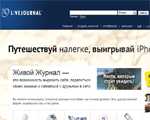19 Oct 2012 | Russia
In July the Russian parliament approved a bill designed to increase the Kremlin’s control of the internet. The new laws grant the government sweeping powers to block access to internet resources.
Russian Wikipedia blacked out to protest the law claiming that it would “lead to the creation of a Russian analogue to China’s great firewall”. Campaigners fear the new rules will lead to widespread censorship. Even though the law doesn’t come into effect until November, Russian internet service providers are already coming under pressure to block internet resources and services.
Here, Andrei Soldatov tells us what Russia censored in September
Click here to find out what Russia censored in October
(more…)
18 Jul 2012 | Europe and Central Asia, minipost, News and features
 A court in Yaroslavl Oblast, Russia, has blocked [Ru] popular blogging platform LiveJournal after one page was accused of publishing “extremist” material. The ban, which will affect an estimated 60,000 Livejournal account holders in the region, and their readers, has been opposed by internet service providers and Roskomnadzor, the federal telecommunications regulator.
A court in Yaroslavl Oblast, Russia, has blocked [Ru] popular blogging platform LiveJournal after one page was accused of publishing “extremist” material. The ban, which will affect an estimated 60,000 Livejournal account holders in the region, and their readers, has been opposed by internet service providers and Roskomnadzor, the federal telecommunications regulator.
17 Apr 2012 | Europe and Central Asia, Index Index, minipost
A video posted online titled “All the Truth about Russians,” was ruled extremist by a Novosibirsk court on Monday. The video, posted on social networking sites by a man from the town of Berdsk who faces extremism charges in the case, has been removed and banned because it shows Russians in a negative light, the regional prosecutor said in a statement. It has been reported that audio accompanying the video included statements about “how easy Russian women are” and how Russian men “are not worthy of being called men”.
2 Apr 2012 | Russia
The Federation Council of Russia has passed anti-extremism legislation which rights activists consider threatening to Kremlin’s public critics. It prohibits people who were charged with extremism to work with children in such fields as education, medical care, social security, sports and recreation.
According to lawmakers, the new legislation aims to protect children from radicalisation. But human rights activists and a number of trade union leaders have expressed their concerns over such law: together with drug and defamation legislation, anti-extremism laws in Russia are often used against Kremlin critics.
The term “extremism” is defined vaguely in Russian law, making it easy for judges to condemn innocent people. For example, if a person publicly criticises police for dispersal of peaceful protesters, he might then be charged with extremism for “incitement to social hatred” according to Russian law.
Another example of anti-extremism law misuse is seen through the prosecution of libraries staff and internet providers for allegedly promoting extremist literature. In practice, some libraries and providers do not have access to information from law enforcement authorities detailing which books are extremist. Examples of this were analysed in detail by SOVA Center for information and analysis, who described anti-extremist legislative measures in Russia as repressive.
Education union leader Andrey Demidov called the new legislation an “employment ban”, explaining that due to the vague definition of extremism and corrupted law enforcement and judicial systems, any teacher who openly criticises the government is likely to be charged on extremism and loose their job forever.
Elections in Russia are mostly held in schools, and most local election commission members are usually teachers. After allegedly fraudulent parliamentary elections, opposition activists appealed to teachers asking them not to participate in fraud. Many supported that request, which, together with high activity from election monitors, led to Vladimir Putin not winning presidential elections in March in Russia’s “two capitals,” Moscow and Saint-Petersburg.

 A court in
A court in